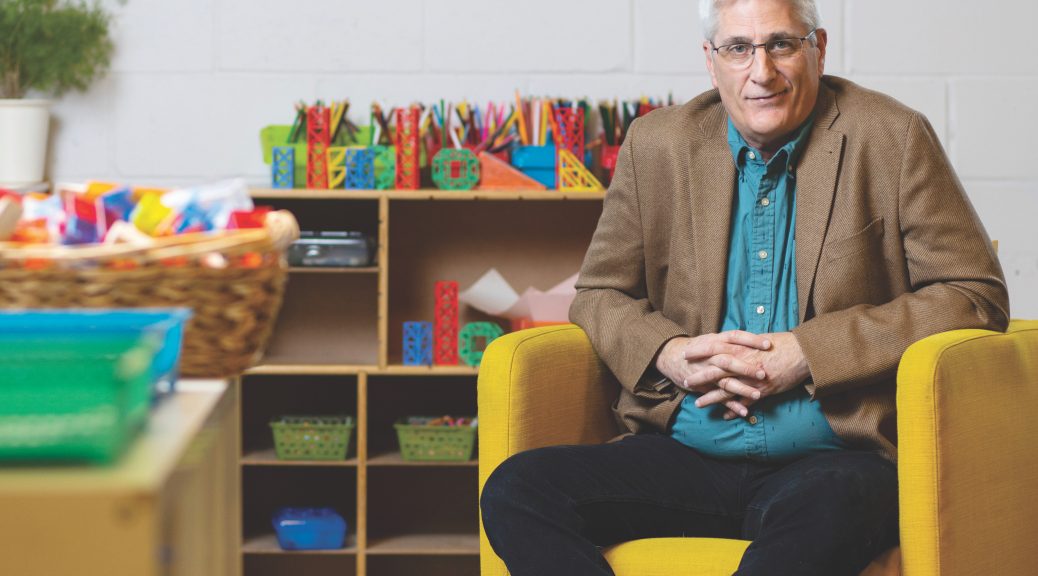For one of his latest research projects, Eric Camburn, Ph.D., and his colleagues filled a large SUV with boxes upon boxes of artifacts that had the potential to answer a question as big as: How can we improve the learning experiences of high school students?
The boxes, packed with teacher assignments and student work, are key to Camburn’s $3.6 million study of an educational program that, at its height, was implemented in as many as 80 public high schools in Iowa. The state poured more than $3 million into the Authentic Intellectual Work program in hopes of increasing student engagement and, ultimately, achievement. But does it work? Was the state of Iowa’s investment worth it?
Camburn is conducting the Study of Iowa High Schools, funded by the U.S. Department of Education, to answer those questions and more.
“Along the way I think we are also going to be able to tell stories about, what does it take to implement rigorous programs like this?” Camburn says. “And what does it take to encourage teachers to change their practices to adopt rigorous teaching practices?”
Camburn brought the Study of Iowa High Schools with him from the University of Wisconsin when he joined UMKC in 2018. He also brought a project in which he and three colleagues around the country are developing a web-based tool called the Day Reconstruction Method to understand teacher tasks throughout a given day and how they feel about those tasks.
The United States has more than 3.5 million public school teachers. Understanding their work lives and well-being is crucial to improving education, Camburn says. “It’s a very demanding, grueling job, and, surprisingly, there just isn’t a solid research base that documents systematically in the way this tool will how teachers feel about their work while they’re doing it,” Camburn says.
The Day Reconstruction Method tool will aid researchers in other education studies — and would have been handy in the Iowa high schools study, he says.
The Study of Iowa High Schools looks at teacher efficacy in implementing the Authentic Intellectual Work initiative. The program was designed by Camburn’s Wisconsin colleague Fred Newmann to encourage high schools to better engage students with more rigorous assignments that apply to real-world, “authentic” situations.
Newmann’s program is based on the idea that rigorous, authentic intellectual work will prompt students to become more invested in their own education and, thereby, improve their achievement. The Iowa Department of Education widely adopted the program, and the program’s leaders encouraged Camburn to study the teaching method’s effectiveness.
Camburn, working with colleague Peter Steiner, Ph.D., now an associate professor at the University of Maryland, began designing the study in 2013. The research examines 44 high schools, half of which have the program, and half that do not.
The Authentic Intellectual Work initiative requires assignments to be designed for higher-order thinking. Rubrics allow teachers to score assignments to make sure they are sufficiently intellectually rigorous and authentic. Teachers gather in groups — an algebra teacher would meet with other math department teachers, for example — to score assignments and ensure adherence to the program’s lofty goals.
Thousands of those assignments then made their way into boxes piled high in the SUV. Trained Iowa educators scored the artifacts using the program’s rubrics to determine how well they adhered to the guidance and goals of the Authentic Intellectual Work initiative.
Camburn measures students’ engagement with their schoolwork by looking at metrics such as skipped classes and how they feel about school. Iowa state assessment scores will tell the achievement story.
The study also looks at how teachers are engaging with the program. Are they participating in the scoring meetings? Are they taking advantage of the professional development opportunities offered to improve their methods? Are they changing how they teach?
“If, over time, teachers are changing their practice in a way that’s consistent with Authentic Intellectual Work standards, our theory is that the experiences students have in the classroom will be better,” Camburn says.
Preliminary findings suggest the program had a small, positive impact on student achievement. The research team is exploring this result in more depth by seeing whether the program was more effective for particular groups of students, or in particular types of schools.
The Iowa education department, with a change in leadership, is no longer backing the Authentic Intellectual Work program. But dozens of schools have chosen to continue with it.
“Interestingly enough, for many programs, that would have been the death knell,” Camburn says. “For this program, there was enough support and interest that it’s been sustained. There are still dozens of schools in the state of Iowa that are basically doing it on their own because they value it so much.”

